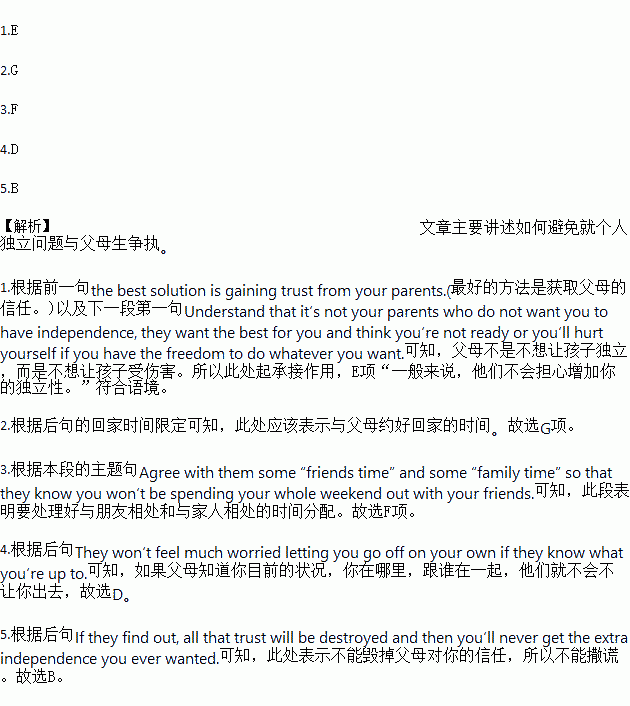题目内容
根据短文内容,从短文后的选项中选出能填入空白处的最佳选项,并在答题卡上将该项涂黑。选项中有两项为多余选项。
Many arguments teenagers have with their parents are about one thing: independence. As you get older, you’ll want to do more stuff on your own, without your mom and dad tagging along with you. The arguments generally start when your parents think you aren’t ready for extra responsibility while you think you are. Arguing with your parents isn’t the best solution at all, but the best solution is gaining trust from your parents. 1.
●Understand that it’s not your parents who do not want you to have independence, they want the best for you and think you’re not ready or you’ll hurt yourself if you have the freedom to do whatever you want. Show your parents you can be sensible. 2.If you can’t get home by 9:30, they’ll never let you out after 10:00.
●Agree with them some “friends time” and some “family time” so that they know you won’t be spending your whole weekend out with your friends. 3.They won’t imagine you getting into trouble if they know how they are.
●4. They won’t feel much worried letting you go off on your own if they know what you’re up to. Call in and tell your parents that you’re OK from time to time. The less they worry about you, the more independence you’ll gain.
●5.If they find out, all that trust will be destroyed and then you'll never get the extra independence you ever wanted.
A. Show your parents how independent you are.
B. Never lie to your parents about where you’re going.
C. Remember to ask for your parents’ help if you need it.
D. Always tell your parents where you are, and who you’re with.
E. Generally speaking, they won’t be worried about increasing your independence.
F. And before you enjoy the “friends time' introduce your friends to your parents.
G. Agree a time you’ll be home with your parents, and always make sure you keep to it.
 天天向上一本好卷系列答案
天天向上一本好卷系列答案 小学生10分钟应用题系列答案
小学生10分钟应用题系列答案London Family friendly hotels
Customer Service - Speak to a London hotel expert
Telephone 02074204969 8 am to 5 pm |
Email a London Expert |
Live Chat 8 am to 5 pm Chat to a London Expert |
Park Plaza Westminster Bridge Hotel London
HOTEL RATING ★★★★ Hotel
ADDRESS Westminster Bridge Road, London, SE1 7UT
LOCATION Close to the London Eye
Double rooms from £106
The Park Plaza Westminster Bridge is a modern hotel a short walk from some of the city’s most famous attractions, such as Big Ben and London Eye.
Athenaeum Hotel London
HOTEL RATING ★★★★★Luxury Business Hotel
ADDRESS 116 Piccadilly, London, W1J 7BJ
LOCATION Opposite Buckingham Palace
Double rooms from £127
Athenaeum Hotel is situated opposite Buckingham Palace, and just down the road from national museums and galleries. The luxurious(奢侈的) accommodation includes park view rooms, spacious apartments and elegant suites.
The Rubens at the Palace Hotel London
HOTEL RATING ★★★★ Hotel
ADDRESS 39 Buckingham Palace Road, London, SW1W 0PS
LOCATION Near Buckingham Palace
Double rooms from £159
This is as close to Buckingham Palace as you can get. There are three dining / bar areas: the Palace Lounge(休息)for afternoon tea, the Cavalry Bar for cocktails, or the“unashamedly old-fashioned”Library Restaurant.
Plaza on the River Club London
HOTEL RATING ★★★★★Apartment
ADDRESS 18 Albert Embankment, London, SE1 7TJ
LOCATION Close to Tate Britain
Double rooms from £185
Riverside rooms at this modern luxury hotel overlook the River Thames with the Houses of Parliament, Big Ben and the London Eye in sight on clear days. All apartments have lounge area and fully equipped kitchen.
1.How will you get hotel expert advice if you’re busy in the day?
A. Calling. B. Writing letters.
C. Sending E-mails D. Having Live Chat.
2.If you’d like to cook your own food, you can choose to stay at ______.
A. Park Plaza Westminster Bridge Hotel B. Athenaeum Hotel
C. Plaza on the River Club D. The Rubens at the Palace
3.Which of the following two hotels are close to each other?
A. Athenaeum Hotel; Plaza on the River Club.
B. Park Plaza Westminster Bridge Hotel; Plaza on the River Club.
C. Athenaeum Hotel; Park Plaza Westminster Bridge Hotel.
D. The Rubens at the Palace Hotel; Athenaeum Hotel.





 be
be